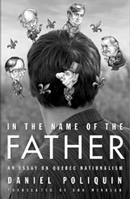
In The Name Of The Father: An Essay On Quebec Nationalism
Daniel Poliquin
Translated by Donald Winkler
Douglas & McIntyre
$22.95
paper
224pp
1-55054-858-1
But the book is much more than the rant of a Franco-Ontarian who has at times felt rebuffed by nationalists in Quebec for his mixed cultural and linguistic heritage. Translated into English by award-winning Donald Winkler, In the Name of the Father is also a celebration of the French revival that “coincided with the great cosmopolitan festival of Expo 67.”
This was an exciting time, Poliquin says, marked by Jacques Godbout’s novel Salut Galarneau!, Réjean Ducharme’s The Swallower Swallowed, Marie-Claire Blais’ A Season in the Life of Emmanuel, and “real Québécois rock star Robert Charlebois,” not to mention “made in Quebec dirty movies.” Like the true Franco-Canadian he is, Poliquin also highlights the work of Manitoba’s Daniel Lavoie and Acadian writer Antonine Maillet, who won France’s coveted Prix Goncourt.
Giving various Quebec governments their due, Poliquin credits them for being the “great architects of this French revival,” a revival which brought the French language into the fields of business and engineering, carried Pierre Trudeau to power in Ottawa, and led to the creation of the Parti Québécois.
This revival allowed Poliquin, younger than most of the writers he extols, to make his own mark on the French cultural map in recent years. He did so with several novels – The Black Squirrel, Obomsawin of Sioux Junction, and the prize-winning The Straw Man, which is set in 1759 on the eve of the battle of the Plains of Abraham.
What makes In the Name of the Father especially interesting are passages that allow the reader to see into the thinking of this bicultural and cosmopolitan French Canadian whose journalist father spoke several languages and read world literature.
As a child growing up in Ontario, Poliquin endured painful experiences of discrimination at school that fuelled his resolve to fight for the rights of French Ontarians. This, however, did not stop him from reaching into the cultural expanse marked by English-speaking Canadians such as writers Margaret Laurence and Robertson Davies, pianist Glenn Gould, and filmmaker Atom Egoyan.
This is where Poliquin parts company with the likes of novelist Yves Beauchemin, whom he berates for characterizing Franco-Ontarians as “still warm bodies,” and filmmaker Pierre Falardeau, “that other great victim of imaginary persecution who declared on the eve of the last referendum that Franco-Ontarians are the doormats on which the English wipe their feet before they enter their homes.”
For Poliquin, Quebec is being stained by a narrow nationalist elite in universities, publishing, the press, and politics. This elite is pushing an “hysteria of victimization” upon a population whose “memory of the Conquest inspires no feeling of humiliation.”
What disappoints him most about the current state of the Quebec intellectual bourgeoisie is that it not only refuses to acknowledge the best of English Canadian culture, but that it also engages in “recolonialization” vis-à-vis France and the U.S.A. “Paris,” he charges, “remains a fundamental reference point and magnet,” and Lucien Bouchard prostrated himself before Washington.
But as does John Ralston Saul in Reflections of a Siamese Twin, Poliquin points out that there are strong parallels with this condition in “so-called English Canada.” As a student in English high school, Poliquin found that Canadian writers were not read; universities, “when they weren’t aping Oxford … were imitating Harvard.”
In the Name of the Father has been called vengeful, but it could only have been written by someone who cares enough about Quebec and the rest of the country to criticize it with such passion. It is worth the read. mRb






0 Comments